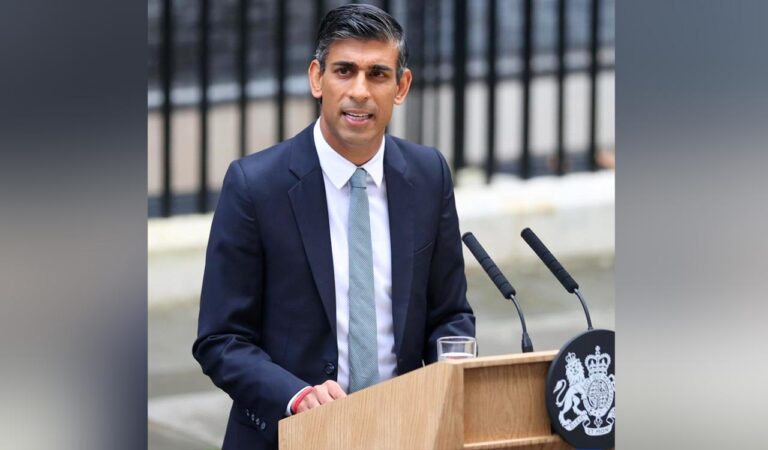Posted: Post Date – 10:45AM, Sun – 11/13/22

Economic experts agree on the scale of the challenge, although they see the prospect of a free trade agreement (FTA) with India as an underlying driver of much-needed economic growth.
London: It has been far from smooth sailing for Rishi Sunak’s government, with the latest official figures released this week reflecting a shrinking economy and a looming two-year recession.
The former finance minister of British India took office at 10 Downing Street last month promising to fix the fiscal mistakes of his predecessor Liz Truss’ disastrous small budget, promising to make controlling soaring inflation a priority and warning that Difficult tax and spending decisions ahead.
Economic experts agree on the scale of the challenge, although they see the prospect of a free trade agreement (FTA) with India as a potential driver of much-needed economic growth.
“The UK’s economic crisis is caused by some new and some long-standing factors,” explained Dr Anna Valero, senior policy researcher at the Centre for Economic Performance at the London School of Economics (LSE).
“High inflation, high interest rates and tight fiscal policy come against a backdrop of particularly low UK productivity growth since the financial crisis, which has been a drag on real wages,” she said.
“The UK also suffers from large and persistent inequality. The combination of slow growth and high inequality has made the UK a ‘stagnant country’ and a new economic strategy is urgently needed to set the country on a path towards a stronger, fairer and more A more sustainable growth path,” she added.
When asked how the India-UK free trade agreement could affect the situation, analysts welcomed Sunak’s commitment to a deal.
“Such a deal could present growth opportunities for the UK, particularly if it is possible to export services – a key area where the UK has a comparative advantage – to a market that is expected to grow significantly over time,” she said. pointed out.
The energy crisis triggered by the Russia-Ukraine conflict is seen as the dominant factor behind the current cost of living crisis in the UK with rising household bills. A sluggish post-pandemic recovery, the hangover from uncertainty over Brexit since Britain’s departure from the European Union (EU) in 2016, and years of underinvestment from austerity policies following the 2008 financial crisis are key factors behind today’s chaos.
Dr George Dibb, head of the Centre for Economic Justice at the Institute for Economic Justice in London, said: “Even before the current crisis, the UK economy suffered from too little investment, economic inequality between and within regions and the resulting low growth.” Public Policy Research (IPPR).
“This has been exacerbated by the ‘austerity’ of the last decade, which means ordinary households have been hit and the quality of education and health services, which are the bedrock of any thriving economy, has declined.
“Russia’s invasion of Ukraine’s massive impact on energy prices, and the resulting cost-of-living crisis, made things worse again; the straw that broke the camel’s back was the recent small budget of the Trump administration and its proposed Unfunded tax cuts, which erode confidence in the UK government and economy,” he reflected.
In his view, the constant change of new prime ministers and governments and changing agendas have made business decisions more challenging, and what is needed now is a period of stability and a plan to deliver a growth agenda like the Sunak government Get ready to submit the crucial fall budget statement next week.
“There are reports that the government is planning to remove the dividend tax allowance, but this is a small step in the right direction and we think we should go further and start taxing dividends at the same rate as income tax. Not only will this raise more money Billions to help support families and businesses, and end the inequity that workers pay more in taxes on their income than shareholders,” added Dr Dibb.
The City of London Corporation, which makes up the UK capital’s financial centre, has also urged the government to focus on boosting growth and investment.
“The upgrade must include all parts of the UK – including London – because the capital’s success benefits every corner of the country,” said policy chair Chris Howard.
Britain’s independent economic research body, the National Institute for Economic and Social Research (NIESR), has also called for a focus on such a fair growth agenda, in which imports cost – especially food and energy – Significantly increased relative to the value of exports.
“The prime minister needs to focus on getting poor households to deal with these shocks, while ensuring there is a clear plan to stabilize public finances in the medium term,” said Hailey Low, NIESR deputy economist.
She is also looking positively on the India-UK Free Trade Agreement as ongoing negotiations head into the new year. As the world’s fifth-largest economy, India’s location at the heart of the Indo-Pacific region adds to the appeal of such a free trade agreement.
“A free trade agreement with India would lead to increased exports, strengthen the UK’s trading position and diversify trade routes, making supply chains more resilient and less susceptible to political developments. To revive UK manufacturing, it would enable The UK has access to cheaper raw materials for manufacturing outside the EU,” Low said.
